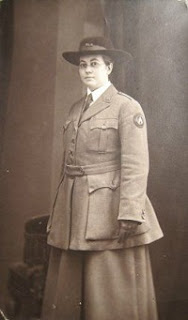In 1918, Emmaline Balakin leaves her sedate Dead Letter Office job to serve in France as a hospital librarian. The injured soldiers at Bazoilles-sur-Meuse are truly grateful for the reading material, though Emmaline is aghast at the treatment of Black servicemen and dismayed by the American government’s censorship regulations.
In 1976, Kathleen Carre, granddaughter of Emmaline’s friend Nellie, breaks gender barriers by enrolling in the U.S. Naval Academy. Between ridiculous uniform requirements (three-inch heels!) and torturous hazing from male classmates, the system seems determined to break her, but she persists.
Romance and long-held secrets provide additional intrigue in this increasingly powerful story. The values of intellectual freedom, antiracist activism, and female friendship are illustrated within their historical contexts, yet these themes couldn’t be timelier.
The War Librarian will be published on August 9th by Putnam in the US. I wrote the review above for Booklist's historical fiction issue (dated May 15th). My editor gave me the opportunity to select books from a list of options, and this was one of them. I chose it not only because the subject interested me, being a librarian myself, but also because the personal story of my library's namesake is relevant to the book's subject.
 |
| Mary J. Booth in her WWI uniform |
Over my own time at Booth Library, I've given many tours covering different aspects of the building's history, including Miss Booth's wartime service, but I hadn't realized how rare an accomplishment this was until I read The War Librarian. "Very few female librarians were sent to France before the end of the war," Armstrong writes in her author's note. In Paris, Miss Booth worked to catalog American books shipped overseas for U.S. soldiers, selecting reading material for men in hospitals and in the trenches. She also cataloged the books at General John Pershing's headquarters at Chaumont.
Needless to say, I'll be purchasing a copy of The War Librarian for my library's recreational reading collection once it's published!
Read more at these external sites:
From NPR: When America's Librarians Went to War.
From the Library History Buff Blog: Women Librarians and ALA's Library War Service in WWI (which has a photo of Miss Booth)
From the Daily Eastern News: Booth's name honors former librarian
From NPR: When America's Librarians Went to War.
From the Library History Buff Blog: Women Librarians and ALA's Library War Service in WWI (which has a photo of Miss Booth)
From the Daily Eastern News: Booth's name honors former librarian





What an amazing review, Sarah! Addison will be at our local independent bookstore in Nashville on August 9. Can't wait!
ReplyDeleteThat's great, I wish I could be there to get a signed copy and attend the gathering!
DeleteThanks for the review! Added to my Goodreads.
ReplyDeleteGreat!
Delete